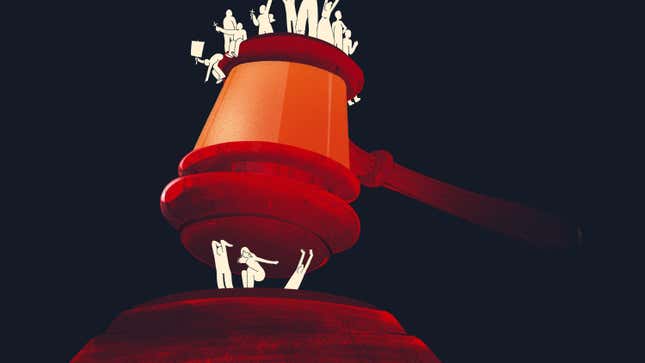How Transphobic Anti-LGBTQ Groups Hijacked a Small Town's Fight for Equality
Latest
Illustration: Chelsea Beck/GMG
When I met Jocelyn, a Parkersburg, West Virginia woman in her early 20s, she was coming off her fourth job interview at the third fast food restaurant in two weeks. She’d made it to the second round with the manager, who’d just told her he wanted to know “how it looked on paper.” On paper, she looked great; her resume listed two previous management positions at fast food franchises before the age of 22. But he was referring to the other paper: the birth certificate.
Eight months into Jocelyn’s gender transition, this was her norm. Sometimes potential employers asked for a letter from her therapist affirming that gender dysphoria is a legitimate medical issue, and that she has been diagnosed with it—but by the time potential employers reached that question, she knew it was pointless. As far as Parkersburg’s anti-LGBTQ residents are concerned, Jocelyn is a “biological male.” She says that, in the end, the manager told her that her presence would scare away their mostly older clientele.
I asked Jocelyn why anyone would require a birth certificate for work in fast food. She laughed quietly and said, “I don’t know.” Jocelyn’s support system is small; her adoptive parents disowned her and, lately, even her friends began to distance themselves from her because of what everybody seemed to refer to as “it”—a way of getting around the phrase “gender transition.” In our time together, she didn’t speak much. She’s hard to reach by cell because she often needs to borrow one from a friend.
When the manager referred to an “older clientele,” he was likely referring to the many Parkersburgians who believe that Jocelyn’s gender transition is a trick to spy on women in bathrooms. Last August, the validity of trans identity was at the center of a debate over a proposed non-discrimination ordinance (NDO), which would have expanded the West Virginia Civil Rights Act on a local level by adding ethnicity, sexuality, sex, genetic information, veteran status, and disability status as categories protected from housing and employment discrimination and access to public facilities.
Far-right religious groups in Parkersburg opposed the NDO, attacking it with transphobic language and characterizing it, in essence, as a “bathroom bill.” A small-scale televised news saga began. State offshoots of national pro- and anti-LGBTQ rights groups appeared. Pastors blasted the LGBTQ “lifestyle” as Satanic and called upon their congregants to petition; hundreds of members of the anti-LGBTQ, Christian-based group Liberty for Parkersburg, or “Liberty,” packed city council meetings with hymn circles and fire-and-brimstone testimony. According to an affidavit filed with the State of West Virginia, one man testified that a pastor approached his home and said that he was working “with city council” to defeat an ordinance that would allow men to watch his daughters shower in their school locker room. A woman testified that a man had repeatedly attempted to try on a dress at the retail shop where she worked; another balked at the comparison between LGBTQ rights and the 1960s civil rights movement. Parkersburg City Council rejected the non-discrimination ordinance that month by an easy 6-to-3 vote; people on both sides of the issue have chalked it up as a victory for Liberty.
Most of the country is in legal limbo for LGBTQ rights policy.
Most of the country is in legal limbo for LGBTQ rights policy. In the 30 states that lack statewide non-discrimination policy based on sexual orientation and gender identity, cities and counties can implement their own rules. As of March 2018, 383 counties and cities have passed some form of non-discrimination ordinance. Nationally, anti-LGBTQ interest groups are well aware of this, and some are standardizing and disseminating rhetoric locally (often echoing the Jim Crow template, which once convinced people that mixed-race bathrooms put white people at risk of venereal disease).
That strategy wound its way to Parkersburg via the West Virginia Family Policy Council, a state branch of Tony Perkins’s Family Research Council, which the Southern Policy Law Center (SPLC) has labelled a hate group. (The Family Research Council’s website describes state Family Policy Councils as “independent entities” that “accomplish at the state level what Family Research Council does at the national level—shape public debate and formulate public policy.”) Liberty for Parkersburg was born of this ideology. A city council member speaking to Jezebel on condition of anonymity, as well as a leader of Fairness for Parkersburg, agree that West Virginia Family Policy Council director Allen Whitt single-handedly steered the outcome. “Allen Whitt is the reason the NDO was tabled,” a person from the pro-LGBTQ opposition said.
The Family Policy Council of West Virginia—namely, the director, Whitt—tends to appear at city council meetings throughout the state when LGBTQ measures come up. (The Family Policy Council, for example, once sponsored a statewide robocall campaign in which a 12-year-old girl says that a man came into her changing room after swim practice.) Fellow travelers like the “gay conversion therapy” network Focus on the Family and the pro-life, “free speech” interest group Alliance Defending Freedom (ADF)—another SPLC-designated hate group—appear at school board meetings and county board of education meetings under state branches. The ADF then bombards these meetings with junk science supporting a theory that gender dysphoria is curable, and threatens lawsuits against schools that have passed non-discrimination policies for transgender students.
-

-

-

-

-

-

-

-

-

-

-

-

-

-

-

-

-

-

-

-

-

-

-

-

-

-

-

-

-

-

-

-

-

-

-

-

-

-

-

-








































